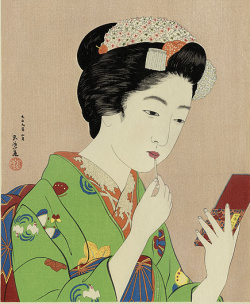What Is It?
Let us first begin with a definition before we tackle the issue of sin. What we commonly refer to as makeup are various substances and chemical compounds people wear for the express purpose of enhancing their appearance.
In modern times, the use of cosmetics is not limited to females, or to being applied only to the face (non-facial scars or birthmarks are sometimes covered), or used only by adults (teenagers sometimes use them to cover the effects of acne).
A Controversial Issue
Without a doubt, makeup has been a hotly debated, and many times divisive, topic among churches and fellowships. Some women have even been ejected from church services (and told never to come back) because they dared to wear cosmetics. Discussions over whether or not God approves of it have raged for years.
"During the past several generations some of the strongest debate among fundamentalists and evangelicals (regarding sin) has centered around questionable practices . . .
"Some of the key issues have been drinking alcoholic beverages, smoking, card playing, wearing makeup . . ." (MacArthur New Testament Commentary on 1Corinthians).

It should be noted that English words such as "makeup" or "lipstick" are not found in Scripture. Direct references to the use of cosmetics are somewhat rare in the Old Testament, occurring only four times (2Kings 9:30, Isaiah 3:14 - 16, Jeremiah 4:30 and Ezekiel 23:40).
The first Biblical reference involves former Israelite Queen Jezebel using makeup in order to try to win the favor of Jehu, the newly anointed king of Israel (2Kings 9:1 - 6, 30). Her attempt to win favor, however, failed miserably (verses 32 - 37).
And Jehu had come to Jezreel. And Jezebel heard this, and had painted her face and adorned her head, and looked out at a window (2Kings 9:30).
Is It Sin?
We need look no further than the creation of man for a guiding principle regarding whether or not it is a sin to wear makeup.
The Bible states that God made everything, including humans and the Garden of Eden, "exceedingly good" (Genesis 1:31, HBFV throughout). He then placed Adam (and soon Eve) in the garden with the express purpose that they "dress it and keep it" (verse 15). What did he, however, expect them to do since everything around them was unspoiled?
God's will was that the first man and woman use their creativity to change and build upon what they were given. Rather than commanding they leave everything untouched (since it was already "good"), he expected and desired that they change the garden to expand and further beautify it as they saw fit.
God wanted the first humans to enhance what they had be given. Based upon this principle, it is not a sin if a woman uses makeup to enhance her appearance and the natural beauty she has received.
New Testament Admonitions
What we find in the New Testament is not a condemnation of makeup as a sin but rather admonitions regarding its proper place and priority in a person's life. The Apostle Paul encourages Christian women to dress modestly and not draw unnecessary attention to themselves by how they look.
In like manner also, let the women adorn themselves with clothing that shows modesty and discretion, not with elaborate braidings of the hair, or with gold, or pearls, or expensive apparel;
But with that which is fitting for women who profess to have reverence for God - with good works (1Timothy 2:9 - 10).
Though cosmetics in general are not forbidden, emphasis should be placed far more on doing good than looking good (1Timothy 2:9 - 10). Peter also admonishes females (especially those married) to place their primary focus not upon how they look but rather on manifesting a righteous character (1Peter 3:3 - 4).
Likewise, you wives, submit yourselves to your own husbands . . .
Whose adorning, let it not be the external adornment of braiding the hair, or wearing gold jewelry, or dressing in costlyclothing;
But let your adornment be the inward person of the heart, manifested in the incorruptible jewel of a meek and quiet spirit, which is of great value in God's sight (1Peter 3:1, 3 - 4).
Wearing makeup (like drinking alcohol) is a question of moderation rather than prohibition. While it is certainly not wrong to forego cosmetics, using them with wisdom and modesty is not a sin. It would be wrong, however, to use them for the express purpose of leading another person to lust and disobey God in their heart. Believers should always be mindful how what they say, and do, will be perceived by others (1Thessalonians 5:22 - 23).